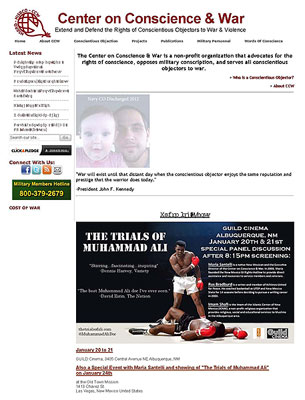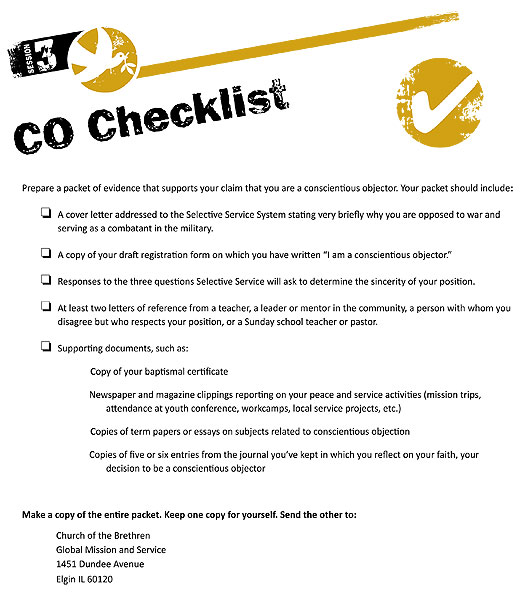
The Center on Conscience and War (website www.centeronconscience.org , shown here) is a non-profit organization that advocates for the rights of conscience, opposes military conscription, and serves all conscientious objectors to war. Formerly known as the National Interreligious Service Board for Conscientious Objectors (NISBCO), it was formed in 1940 by an association of religious bodies including the Church of the Brethren. Its mission statement, in part: “The center is committed to supporting all those who question participation in war, whether they are US citizens, permanent residents, documented or undocumented immigrants–or citizens in other countries.” Services are provided to the public at no charge. CCW participates in the G.I. Rights Hotline, a national referral and counseling service for military personnel. In the event of a military draft, CCW will assist in the placement of conscientious objectors in alternative service programs. The Center is opposed to all forms of conscription.
By Lucas Kauffman
When young American men turn 18, they are required to register with the Selective Service System (SSS) because of federal law (50 U.S.C. App. 451 et seq). That law requires almost every male citizen, as well as immigrant men living in the United States, to register in the event of a military draft. Women are not required to register, nor are men 26 and older.
For officials, a high compliance rate is important, since that would mean that any military draft that might come up would be fair. To make sure there is 100 percent compliance, a lot of states have created legislation that links SSS registration with the process of applying for a driver’s license or state identification card.
Delaware was the first state that reached a nearly 100 percent compliance rate, since beginning the legislation in 2000. Seven other states also increased compliance rates after similar driver’s license legislation in 2002, the Selective Service reports on its website.
Reasons for these state laws include assuring eligibility for some programs and benefits to their citizens, because men who fail to register with Selective Service are not eligible for programs and benefits that Congress, 41 states and territories, and the District of Columbia have linked to registration for the draft. That would include student loans and grants for college, most government jobs, and job training. Also, immigrants who fail to register when they are at least 18 but not yet 26, may be denied citizenship.
Typical state legislation instructs the Department of Public Safety or Motor Vehicles to include a consent statement on all applications or renewals for driver’s permits, licenses, and identification cards, the SSS website says. The statement tells the applicant that by signing the application, he consents to his registration with the SSS. The applicant’s data is transferred to the SSS electronically through an arrangement the state has with the data sharing system of the American Association of Motor Vehicle Administrators.
A problem for nonregistrant conscientious objectors?
For those who do not want to register for the draft or who decide to be nonregistrant conscientious objectors, this legislation could be a problem. According to Bill Galvin, the counseling coordinator at the Center on Conscience and War, there is at least one option. “One option that people have is just not apply for a driver’s license until they turn 26 years old,” he said.
However, young men who do not register for the draft may be denied financial aid for college through the federal government. Galvin said that the Center on Conscience and War may be able to help provide funding, if that happens.
The Center on Conscience and War, based in Washington, D.C., was founded in the 1940s by the Historic Peace Churches–Church of the Brethren, Mennonites, and Quakers. According to Galvin, the center exists to help protect the rights of conscientious objectors.
“We are active in the G.I. Rights Hotline, which is a hotline that people can call if they want to not be a part of the military anymore,” said Galvin. The center also monitors state laws such as the automatic registration into the draft, advocates for the rights of conscientious objectors, and helps immigrants and people of different religious backgrounds apply for conscientious objector status.
Since the Center on Conscience and War is opposed to a military draft and conscription, it does not want the law that protects the rights of conscientious objectors to go away, Galvin commented when asked about the necessity of a Selective Service System in light of automatic draft registration in so many states. If Selective Service were done away with, the Center on Conscience and War could still exist he said. “Churches do support us, especially if they have conscientious objectors in their congregations,” said Galvin.
“I believe that as long as there is war, there will be conscientious objection. The need for our work will go on.”
Find an article on “Selective Service Registration: Coercion of Conscience?” from the Center on Conscience and War at www.centeronconscience.org/co/5-draft/320-selective-service-registration-coercion-of-conscience.html .

Conscientious objector checklist, from the curriculum Call of Conscience published by the Church of the Brethren at www.brethren.org/co .
Role of Brethren Volunteer Service in event of a draft
Director of Brethren Volunteer Service (BVS) Dan McFadden offered his thoughts about the legislation that links Selective Service registration with driver’s licenses. “BVS would provide an opportunity for alternative service [in the event of a draft], and it has done so in previous drafts,” said McFadden. “There would most likely be more people that sign up for BVS to look for service opportunities, if there was a draft.”
Not many people know about the legislation that links registration with driver’s licenses, he said. “For most people, this is not a big deal. However for a conscientious objector, if you are not registered and you are in college, the government can block federal student loans.”
If that happens, McFadden said that some Church of the Brethren related schools, such as Manchester University, “will help with student loans, if you are not able to get loans because of not registering for the draft.”
McFadden has heard about and kept up to date on the legislation through regular conference calls with the Selective Service and other Anabaptist and church volunteer organizations. He thinks that the driver’s license legislation is a way the government is improving compliance rates, just like Selective Service wants. “It is a way to streamline the people who register,” he said. “This is a way to have names of people on hand, if there ever is a draft.
“This legislation does not really matter if you are planning on registering with the Selective Service,” said McFadden.“You have to selectively say that you do not want to, by sending in materials.
“Personally, I do not really think that the Selective Service System is necessary,” he added. However, he clarified that “the Selective Service draft system is one place where the federal government recognizes conscientious objectors.” If the current Selective Service System was dismantled, “there is no guarantee that a new selective service put back into place in the future would recognize the right to conscientious objection,” McFadden said. “If they do away with the system, conscientious objectors would not receive any recognition.”
How to register as a conscientious objector
While there is no official way to register as a conscientious objector, men may inform the government that that they are conscientious objectors by filling out a paper form and writing a personal statement.
According to McFadden, conscientious objectors should send in paperwork to the Selective Service using the “mail-back”registration forms that are available at any US Post Office. On that form, young men may write, “I am a conscientious objector,” and make several photocopies before mailing the form to Selective Service. McFadden has been informed by Selective Service staff that the department keeps a copy of all of the paper registration forms they receive.
Conscientious objectors should make several copies of the form and their personal statement, to keep for themselves, and to mail a copy to be kept on file by the denomination. Mail to the Church of the Brethren General Offices, Attn: Global Mission and Service Office, 1451 Dundee Ave., Elgin, IL 60120. Some Brethren congregations may provide this service to their members by keeping a file for conscientious objectors.
Information about conscientious objection including a check list to prepare evidence to support a CO claim, and other helpful resources, are available at www.brethren.org/CO .
States with laws linking registration to driver’s licenses
Following is a list of the 40 states, 4 territories, and the District of Columbia that have such legislation in effect, as of Oct. 25, 2013, according to the SSS website: Alabama, Arizona, Arkansas, Colorado, Connecticut, Delaware, Florida, Georgia, Hawaii, Idaho, Illinois, Indiana, Iowa, Kansas, Kentucky, Louisiana, Michigan, Minnesota, Mississippi, Missouri, Montana, Nevada, New Hampshire, New Mexico, New York, North Carolina, Ohio, Oklahoma, Rhode Island, South Carolina, South Dakota, Tennessee, Texas, Utah, Virginia, Washington, West Virginia, Wisconsin, Guam, Northern Mariana Islands, Virgin Islands, District of Columbia.
States and territories that have enacted but not yet implemented the legislation are Maine, Maryland, Puerto Rico.
Find out if you have automatically been registered for the draft by typing in name and social security number at the Selective Service website www.sss.gov .
— Lucas Kauffman is a senior at Manchester University in N. Manchester, Ind., and a January term intern with the Church of the Brethren News Services.